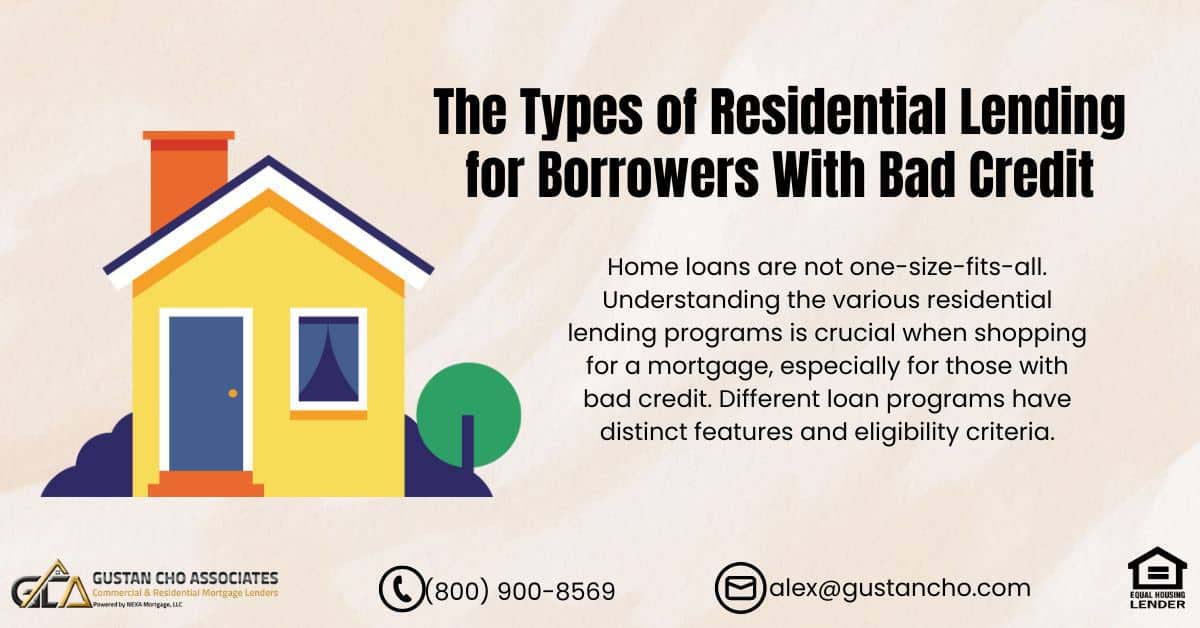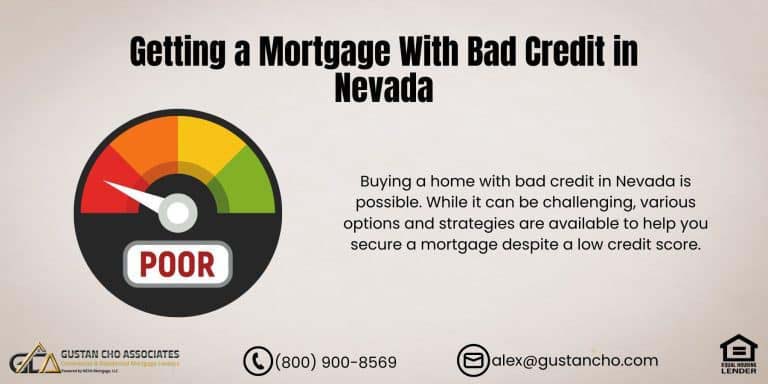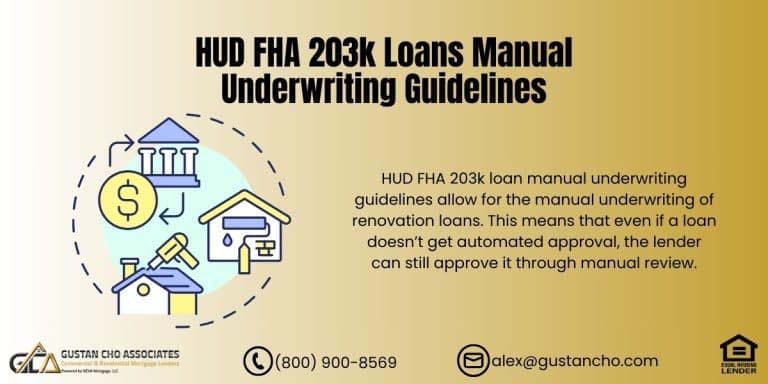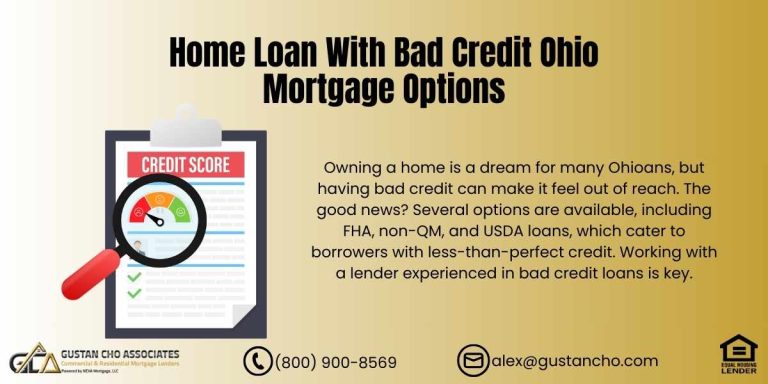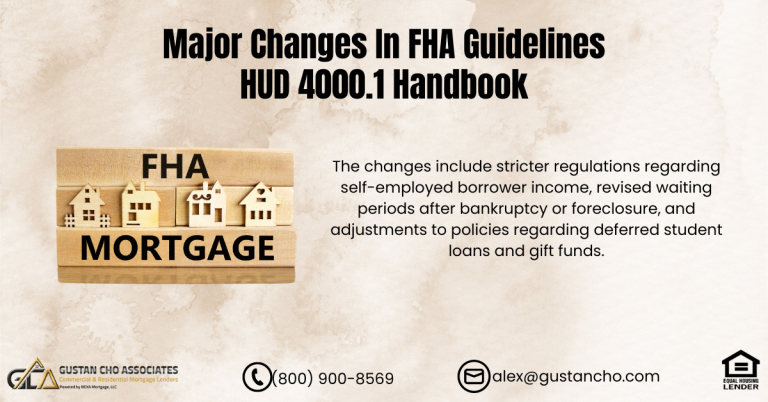This guide covers the different types of residential lending for homebuyers with bad credit out in todays marketplace for owner-occupant home, second homes, and investment properties. Most folks will need to know with types of residential lending when shopping for a homeThere are many types of residential lending when it comes to home mortgages, Home loans are not all the same, There are various types of residential lending when it comes for homebuyers shopping for mortgage loans,
Residential mortgages have gone through many ups and downs after the 2008 real and mortgage meltdown, Countless regulations were created and launched with the various types of residential lending.
On this blog, I will cover the various types of residential lending programs out there. Hopefully, after reading this article, borrowers can decide which types of residential lending are best and will best suit their needs.In this blog, we will discuss and cover the different types of residential lending for bad credit on a home purchase.
What Are Government Loans?
Government Loans are residential mortgages that are guaranteed and insured by the federal government. FHA, VA, USDA will insure lenders if borrowers default on their government loans: In the following sections we will cover what government-backed loans are and how they work. The mortgage loan program in the following paragraphs, we will go over each of the three government-backed loan program available. Below are the types of residential lending programs that are classified as government loans:
What Are FHA Loans
FHA loans is insured and guaranteed by the United States Department of Housing and Urban Development, HUD. HUD is the parent of the Federal Housing Administration or FHA. HUD insures lenders who are HUD-approved lenders against borrowers who default on their FHA loans. Hombuyers can qualify for a 3.5% down payment home purchase FHA Loan with 580 FICO credit scores:
HUD will allow non-occupant co-borrowers to be added for borrowers who do not qualify due to higher DTI. Non-occupant co-borrowers need to be related to the borrowers by either law, blood, or marriage for 3.5% down payment.
HUD will allow up to 6% in seller concessions to be offered by the home seller. Seller concessions can be used for closing costs but not for the down payment on a home purchase. Gustan Cho Associates’ business model is originating and funding government and conventional loans with no overlays. Click here to apply for FHA loans
VA Mortgage Guidelines
VA loans is insured and guaranteed by the United States Department of Veteran Affairs. VA insures lenders against borrowers who default on their VA loans. Lenders who originate VA loans and follow VA Lending Guidelines are insured by the Department of Veteran Affairs if the borrower were to default on their VA mortgages. VA loans is only for active or retired members of the United States Armed Services with a valid VA Certificate of Eligibility Certificate. There is no down payment requirement with VA Loans
There is no mortgage insurance premium required. There is a VA upfront funding fee required where it can be rolled into the loan balance. VA Loan Programs is the best mortgage loan program available
Borrowers need to be veterans with a VA Certificate of Eligibility to be eligible. Can add a working spouse to VA Loan. However, VA allows spouse as a co-borrower. Cannot add any other family member which is related to the veteran by blood, marriage, or law like HUD, the parent of HUD allows will allow you to get a 4% seller concession from the home sellers to use for closing costs. Most investors of Gustan Cho Associates has no overlays on VA loans.
USDA Mortgage Guidelines
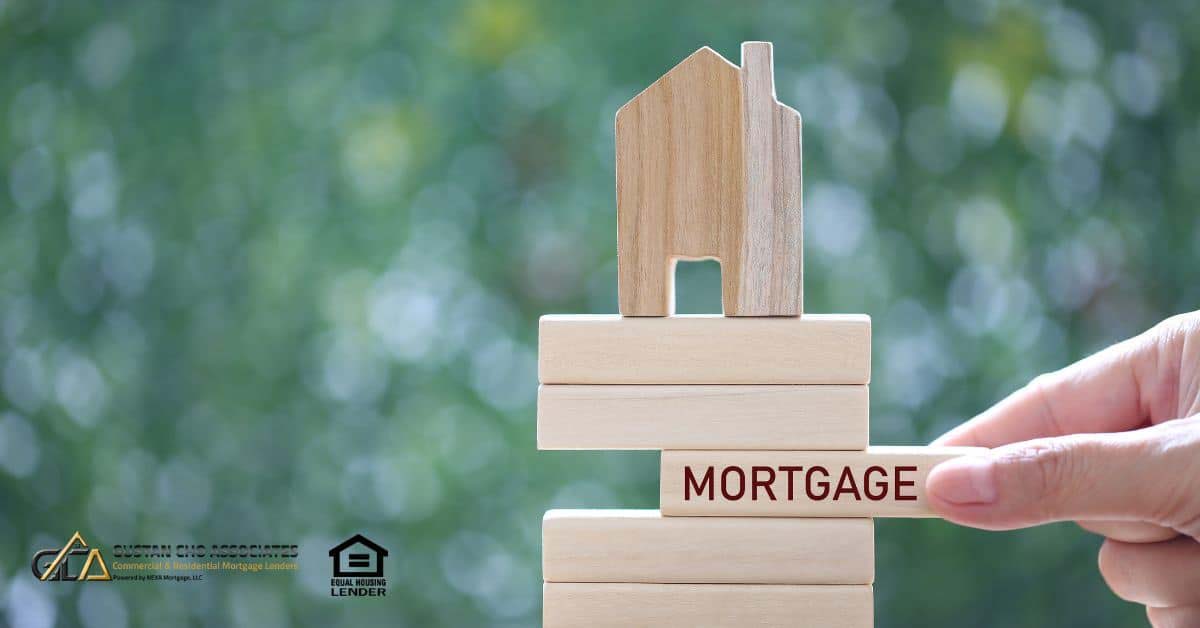
USDA loans, The United States Department of Agriculture is the parent of Rural Housing and Urban Development, USDA. USDA will insure and guarantee lenders who originate and fund USDA loans if Borrowers were to default on their USDA Loans. USDA loans does not require home buyers to put any money down on a home purchase. USDA loans are only eligible for properties that are located in a USDA designated area. USDA requires a borrower cannot exceed a certain household income limit depending on the area.
The maximum debt-to-income ratios is capped on USDA loans to 29% fron-end and 41% DTI back-end. USDA borrowers need a minimum of a 580 credit score. Gustan Cho Associates has no overlays on USDA loans
Our minimum credit score requirements are 580 FICO. Government loans are for only owner occupant homes only.. Any property from one to four units that have been zoned residential can qualify for government loans. Second homes and investment properties are not eligible for government loans. Fannie Mae and Freddie Mac are the only conforming loan programs that offer second home loans and investment property loans.
Conventional Loans
Conventional Loans are different than government-insured mortgages. Conventional Loans need to follow the lending guidelines of Fannie Mae and Freddie Mac. Fannie Mae and Freddie Mac are called government-sponsored enterprises, also known as GSE. Fannie Mae and Freddie Mac are not owned by the federal government. Fannie Mae and Freddie Mac are both private mortgage corporations owned by private stockholders but is considered government-sponsored enterprises, or GSEs.
Click here to apply for FHA , VA, USDA and Conventional loans
Here Are Some Bullet Points on Conventional Loans
Minimum credit scores required to qualify for Conventional Loans is 620 FICO. The maximum debt-to- income ratios allowed for Fannie Mae is 50% DTI to get an approve/eligible per Automated Underwriting System. The maximum debt to income ratios permitted for Freddie Mac is 50% DTI to get an approve/eligible per Automated Underwriting System; W-2 Income Only with no need for tax returns is permissible with Fannie Mae Conventional Loan Programs. However, Freddie Mac does not allow W-2 Income Only Conventional loan programs. Conventional loans are for one to four unit properties. Owner occupant, second homes, and investment properties are eligible for Conventional Loans. Maximum Conventional Loan Limits, excluding high-cost areas, are capped at $766,550. Conventional Loans are called conforming loans. This is because they need to conform to Fannie Mae and Freddie Mac conforming guidelines. Most of our Fannie/Freddie wholesale lenders do not have any overlays on Conventional loans.
Jumbo Mortgages
Any mortgage loans that are higher than the $453,100 loan limit is called non-conforming mortgages: This is because they do not conform to Fannie Mae or Freddie Mac’s maximum conforming loan limit of $766,550 and is classified as Jumbo mortgages. Mortgages that are higher than $766,550 loan limits unless the property is located in high-cost areas are called Jumbo mortgages.
Higher lending standards apply on Jumbo loans. In this guide, we will cover some key points on Jumbo mortgages: Most Jumbo lenders will require a minimum credit score of 700 FICO.
Most Jumbo lenders will require 80% LTV, Loan To Value. Maximum debt-to-income ratios on Jumbo mortgages are capped at 43% DTI. Jumbo mortgages from $766,550 up to $5,000,000 are called Jumbo loans. Jumbo mortgages larger than $1,000,000 are often called Super Jumbo loans. Require a larger down payment. Gustan Cho Associates does have special Jumbo loan programs that only require 5% down payment or 95% LTV, Loan To Value and NON-QM loans for borrowers of higher-end homes.
NON-QM Loans
Non-QM Loans are out of the box mortgage loan programs offered by Gustan Cho Associates. Non-QM Loans are often called out-of-the-box mortgage loans. This is because it does not fit to traditional lending guidelines.
Types of Residential Lending: Non-QM Loans
Here are some examples of Non-QM loans. Non-QM loans has no waiting period after bankruptcy, foreclosure, deed-in-lieu of foreclosure, short sale to qualify for a home loan
No Maximum Loan Limits Up to $5 Million
No private mortgage insurance required.
Exemption with deferred student loans
Non-QM loans do not require a fully amortized monthly student loan payment on an extended payment plan. Deferred student loans deferred longer than 12 months are exempt from debt to income ratio calculations
No Income Verification Loans
Investment Non-QM loans do not require income tax returns. Or income verification if the borrower puts 30% down payment and has a 640 FICO.
Bank Statements Mortgage Loans For Self-Employed Borrowers
Self-employed borrowers can qualify for Non-QM loans without tax returns or income verification and can go off bank statements.
Terms and Types of Residential Lending
Most terms and types of residential lending programs are based on 30-year mortgages. However, below are the terms and types of residential lending programs available today.
30 year amortized loan programs
Options of adjustable rate mortgages and 30 year fixed rate mortgage loans
10 year, 15-year, 20-year, 25-year, and 30-year fixed-rate mortgages are available for all loan programs
Fully amortized and interest only mortgages available
Mortgage rates are based on loan to value, credit scores, and the type of property
Qualification Requirements on The Various Types Of Residential Lending
Qualification requirements depend on the types of residential lending programs. Here are the basic qualification requirements on the various type of residential lending programs we have to offer:
Minimum credit scores of 580 FICO on FHA Loans USDA Loans with no overlays
No minimum credit score requirements on VA Home Loans
Minimum credit scores of 620 FICO on Conventional Loans
For more information, please contact Gustan Cho Associates at 800-900-8569 or text us for a faster response. Or email us at gcho@gustancho.com. We are available 7 days a week, evenings, weekends, and holidays.
FAQ – The Types of Residential Lending for Borrowers With Bad Credit
- 1. Why is it important to know about different types of residential lending? Home loans are not one-size-fits-all. Understanding the various residential lending programs is crucial when shopping for a mortgage, especially for those with bad credit. Different loan programs have distinct features and eligibility criteria.
- 2. How have residential mortgages changed since the 2008 real and mortgage meltdown? After the 2008 crisis, numerous regulations were introduced, shaping the landscape of residential lending. This guide explores the impact of these changes and helps borrowers navigate the current market.
- 3. What are Government Loans? Government Loans are residential mortgages guaranteed and insured by the federal government. This includes FHA, VA, and USDA loans. The guide delves into these programs, explaining their features and eligibility criteria.
- 5. What is an FHA loan? FHA loans are insured and guaranteed by HUD, which enables borrowers to qualify with a credit score as low as 580 and a 3.5% down payment. The guide outlines additional features and benefits, such as non-occupant co-borrowers and seller concessions.
- 6. What are VA Mortgage Guidelines? VA loans are available for active or retired United States Armed Services members. The Department of Veteran Affairs insures these loans. This program offers no down payment requirement and exempts borrowers from mortgage insurance premiums. The guide provides detailed insights into VA loan eligibility and benefits.
- 7. What are USDA Mortgage Guidelines? USDA loans, which the United States Department of Agriculture insures, are available for specific designated areas and do not require a down payment. The guide outlines income limits, credit score requirements, and other key aspects of USDA loans.
- 8. What are Conventional Loans? Conventional Loans follow Fannie Mae and Freddie Mac guidelines. Unlike government-insured loans, they are not secured by the government. The guide explains credit score requirements, debt-to-income ratios, and property eligibility for conventional loans.
- 9. What are Jumbo Mortgages? Jumbo Mortgages are non-conforming loans that exceed the maximum conforming loan limit. The guide provides information on credit score requirements, loan-to-value ratios, and special Jumbo loan programs.
- 10. What are NON-QM Loans? Non-QM Loans, offered by Gustan Cho Associates, are unconventional mortgage programs for borrowers who must fit traditional lending guidelines. The guide highlights examples of non-QM loans, including those with no waiting periods after financial hardships and no income verification requirements.
- 11. What terms and types of residential lending programs are available? The guide covers various loan terms, including 30-year amortized loans, adjustable-rate mortgages, and fixed-rate mortgages with different durations. It also explains how mortgage rates are determined based on loan-to-value ratios and credit scores.
- 12. What are the qualification requirements for these residential lending programs? Qualification requirements vary for each program. The guide summarizes minimum credit score requirements for FHA, VA, USDA, and Conventional Loans.


